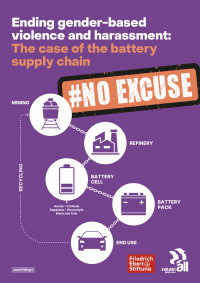6 February, 2025The global shift to renewable energy has put the battery supply chain in the spotlight, but behind the scenes, workers, particularly women, face alarming levels of gender-based violence and harassment (GBVH). To combat this, IndustriALL has released a new toolkit offering concrete strategies to address this urgent issue.
| Ending Gender-Based Violence and Harassment: The Case of the Battery Supply Chain (ENGLISH) |
 |
In many workplaces, women remain disproportionately vulnerable due to unsafe working conditions, lack of enforcement of labour rights and cultural norms that exacerbate discrimination. IndustriALL’s toolkit not only highlights the risks of GBVH in the battery supply chain but also equips workers and unions with actionable solutions.
IndustriALL’s new toolkit, Ending Gender-Based Violence and Harassment: The Case of the Battery Supply Chain, provides trade unions, workers but also companies with the tools they need to identify and prevent GBVH in the world of work. The battery supply chain spans industries from mining and refineries to battery cell production and assembly, where women often endure unsafe conditions, harassment and exploitation.
IndustriALL encourages trade unions to bring a gender perspective into HRDD to address the root/structural causes of gender inequalities and identify multiple and intersecting forms of discrimination.
What’s inside the toolkit?
- A roadmap to gender-transformative human rights due diligence (HRDD)
- Risk assessment of GBVH adapted to the OECD’s six steps in the HRDD process
- Real-world case studies, including successful trade union strategies in Indonesia
- Insights on how to integrate ILO Convention 190 (C190) into workplace policies and on human rights and responsible business conduct
- Tools for workers and unions to negotiate effective policies and hold companies accountable
“With global frameworks like ILO C190, which establishes clear guidelines for addressing workplace violence, the time to act is now. Companies must be held accountable, and unions must be empowered to protect their members,”
says Christina Olivier, IndustriALL assistant general secretary.
“We can build a battery supply chain that prioritizes workers’ rights, safety, and dignity. Let’s make this transition to clean energy truly just and inclusive for all.”
What can I do?
Unions: Use this toolkit to demand stronger risk assessment and prevention processes of GBVH and a gender transformative HRDD.
Companies: Promote gender equality and norms that, implement zero-tolerance policies and strengthen risk management of GBVH.
Governments: Support the ratification and enforcement of ILO C190 to create safer workplaces worldwide.
